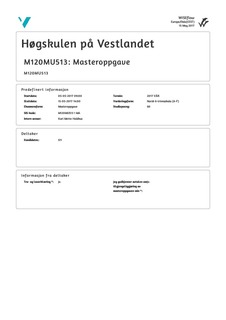| dc.contributor.author | Nysæther, Eyolf Thovsen | |
| dc.date.accessioned | 2018-02-01T14:40:41Z | |
| dc.date.available | 2018-02-01T14:40:41Z | |
| dc.date.issued | 2017-05-15 | |
| dc.identifier.uri | http://hdl.handle.net/11250/2481373 | |
| dc.description | Masteroppgave i musikkpedagogikk | en_GB |
| dc.description.abstract | Denne forskningen har foregått i et kommunalt musikkverksted for jenter i alderen i 11-19 år i en storbykommune i Norge. Musikkverkstedet er lokalisert på et kulturhus med moderne og velutstyrte fasiliteter for musikkpraksis og har bandopplæring i rytmisk musikk som fokus. Forskningen bruker en etnografisk tilnærming med deltakende observasjon som forskningsmetode, i tillegg baserer empirien seg på en roterende ideutvikling, en skriftlig kartleggingsundersøkelse og et gruppeintervju. Med bakgrunn i tidligere forskning som viser at jenter er i sterkt mindretall som instrumentalister på bandinstrumentene trommer, bass, elgitar og keyboard, har denne studien fokus på jenters opplevelse av det å spille i band. Forskningsspørsmålet for studien er: Hvilke behov for kompetanse og tilrettelegging har jentene i musikkverkstedet når de skal drive bandvirksomhet innen rytmisk musikk? Studien benytter sosiokulturelle perspektiv med Yrjö Engeströms kulturhistoriske aktivitetsteori som analysemetode. Denne studien tangerer områder som musikk og kjønn, musikkopplæring, «informal learning»-pedagogikk, og musikk og identitet. Forskningen gir et innblikk i hvordan musikkverkstedets jentefellesskap og organiseringen av opplæringen klarer å gjøre jentene til kompetente kvinnelige musikere i det lokale musikkmiljøet. Flere av jentene agerer etter hvert selvstendig og etablerer egne band med både jenter og gutter som bandmedlemmer. I studien vises også den sterke innflytelsen deltagelsen i musikkverkstedet og samspillet i band har på jentenes livsmestring og identitetsutvikling. Forskningen viser videre at selv om elevstyrt opplæring innen rytmisk musikk er en suksessfaktor, utgjør elevstyrt læringsaktivitet også en utfordring for jenters praksis som instrumentalister på bandinstrument, da dragningen til vokalistrollen er sterk. Denne studien er et eksempel på at kultur-historisk aktivitetsteori og sosiokulturell teori kan bidra med nye perspektiver og innganger til forskningsfeltet musikk og kjønn og jenters utøving av rytmisk musikk i ungdomstiden. Nøkkelord: Musikk og kjønn, jenter og musikk, elevstyrt læring, «informal learning», rytmisk musikk, kultur-historisk aktivitetsteori og musikk, ungdom og identitet. | en_GB |
| dc.description.abstract | This research has taken place in a municipal music workshop for girls aged 11-19 in a big town municipality in Norway. The music workshop is located at a cultural center with modern and well-equipped music practice facilities and has band training in popular music as the focus. This research uses an ethnographic approach with participatory observation as a research method, in addition, the empirical data bases itself on a rotational idea development, a written survey and a group interview. Based on previous research, which shows that girls are in severe minority as instrumentalists on the drums, bass, electric guitar and keyboard, this study focuses on girls' experience of playing in bands. The research question for the study is: What needs for skills and facilitation do the girls in the music workshop have when they are to perform in band activities within popular music? The study uses socio-cultural perspectives with Yrjö Engeströms cultural-historical activity theory as an analytical frame of method. This study addresses areas such as music and gender, music education, informal learning pedagogy, and music and identity. The research provides an insight into how the music workshop's community of girls and the organization of the training, manage to make the girls become competent female musicians in the local music community. Several of the girls eventually act independently and establish their own bands with both girls and boys as bandmembers. The study also shows that the girls' participation in the music workshop performing in bands has a strong influence on their life mastery and identity development. The research further shows that although student-directed learning in popular music is a factor of success, student-directed learning also poses a challenge for girls' practice as instrumentalists on band instruments, as the attraction to the vocalist position is strong. This study is an example that cultural-historical activity theory and sociocultural theory can contribute new perspectives and inputs to the field of music and gender and girls' practice of popular music in adolescence. Keywords: Music and gender, girls and music, student-directed learning, informal learning, popular music, cultural-historical activity and music, adolescence and identity. | en_GB |
| dc.language.iso | nob | en_GB |
| dc.publisher | Høgskulen på Vestlandet/ Western Norway University of Applied Sciences | en_GB |
| dc.rights | Attribution-NonCommercial-ShareAlike 3.0 Norway | * |
| dc.rights.uri | http://creativecommons.org/licenses/by-nc-sa/3.0/no/ | * |
| dc.subject.other | musikk og kjønn | en_GB |
| dc.subject.other | jenter og musikk | en_GB |
| dc.subject.other | elevstyrt læring | en_GB |
| dc.subject.other | "informal learning" | en_GB |
| dc.subject.other | rytmisk musikk | en_GB |
| dc.subject.other | kultur-historisk aktivitetsteori og musikk | en_GB |
| dc.subject.other | ungdom og identitet | en_GB |
| dc.subject.other | music and gender | en_GB |
| dc.subject.other | girls and music | en_GB |
| dc.subject.other | student-directed learning | en_GB |
| dc.subject.other | informal learning | en_GB |
| dc.subject.other | popular music | en_GB |
| dc.subject.other | cultural-historical activity and music | en_GB |
| dc.subject.other | adolescence and identity | en_GB |
| dc.title | «Klart du kan!» – Bandpraksis i et musikkverksted for jenter | en_GB |
| dc.title.alternative | «Sure you can!» – Band practice in a music workshop for girls | en_GB |
| dc.type | Master thesis | en_GB |

